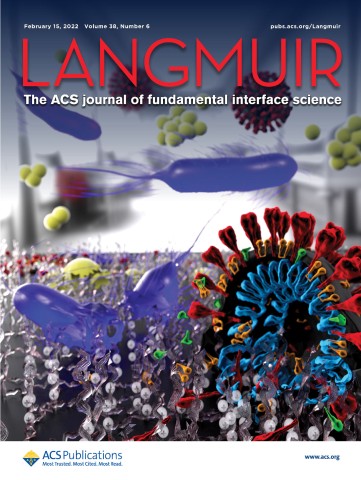Transmission without surface contact: Scientists develop new “Gemini-Quaternary technology” to form self-disinfecting surfaces to prevent the spread of viruses and bacteria
February 17, 2022 – Since the onset of the COVID-19 pandemic, people around the world have begun to critically discern the effectiveness of sanitation. A solution to mitigate the surface transmission of infectious diseases has now been developed by scientists from the University of California, Santa Barbara and ACatechol, Inc. (USA) through an international collaboration. This innovative scientific research has been published in the prestigious Langmuir (a peer-reviewed journal published by the American chemical society) and prominently displayed on the cover page of the journal. In the study, the new sanitizing technology outperformed currently available sanitizing and disinfection products with up to 100,000,000 times higher germicidal effectiveness on the surface.
Scientists around the world have been working progressively to develop new sanitation or disinfection technologies to ensure the absence of transmission of harmful microorganisms through surface contact. Studies show that people touch their face an average of 16 to 23 times per hour, with half of the contact involving the mouth, eyes and nose. Yet current products could not prevent the spread of pathogens via surface contact because it is impossible to wash/sanitize hands, or clean/sanitize objects with every physical contact or droplet deposit. In addition, the surfaces are prone to reinfection immediately afterwards.
Current approaches to solving these problems involve either incorporating heavy metals or biocides such as monoionic quaternary ammonium compounds into surfaces. However, these approaches take several hours to kill germs, and depletion of active ingredients after multiple contacts is inevitable.
“Unfortunately, due to lack of knowledge and misunderstanding, people are currently using metal coated stickers and coatings incorporating biocides in high traffic contact areas for mitigation, which rely on leaching,” says Professor Dr. Kollbe Ahn Ando, corresponding author of this research paper.
The above problems can now be solved by new technology with Gemini-Quaternary Silane. Gemini surfactants are a new class of surfactants that possess two or more hydrophilic head groups separated by a spacer, and display surface activities often orders of magnitude higher than their conventional counterparts.
Despite their superiority, Gemini surfactants have yet to be translated into virucidal/antimicrobial coatings.
“Thanks to the National Science Foundation’s COVID-19 research grant, in this project we have developed a new class of quaternary ammonium coatings mediated by structural elements of potent Gemini surfactants,” said Dr. Linstadt, author principal of the study.
Study shows new class of Gemini-mediated surface disinfection technology immediately kills and inactivates pathogens, including SARS-CoV2 and various hospital-acquired bacteria as well as bacteria causing skin problems, and continues to remain active on surfaces between cleanings with > 99.99% residual effectiveness. The germicidal barrier can last up to 15 days.
“This technology has the potential to save 11 million lives each year from bloodstream infections, the leading cause of hospital death. These nosocomial infections are transmitted through surfaces,” said Dr. Kollbe.
Hand sanitizers compatible with Gemini technology are already registered with the FDA and registration of sanitizers with this Gemini technology is currently in progress with the EPA.
To learn more about the study, visit: https://pubs.acs.org/doi/10.1021/acs.langmuir.1c03401
For more information on the hand sanitizer product, visit: https://www.oneforallhands.com
To know the research team, visit: https://www.acatechol.com
Media Contact
Company Name: ACatechol Inc
Contact: Hiroshi Yasuda
E-mail: Send an email
Call: 800-896-8092
Address:421 N Milpas St
Town: St. Barbara
State: California 93103
The country: United States
Website: https://www.acatechol.com/


Comments are closed.